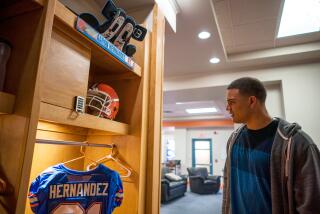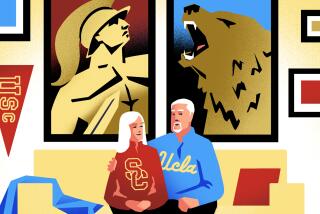A fraternity of one
- Share via
San Francisco — Brad LAND is saying goodbye to his younger brother, Brett, in front of a hotel here. They embrace. Brad pecks Brett on the cheek. “Love you, man,” he says.
Brett is 13 months, 2 days younger than Brad but stands several inches taller, fills out his clothes better. He’s the kind of guy who always seems to be standing in the center of the room, not the corner, which is where you’re likely to find Brad, who is usually mistaken for Brett’s younger brother. Brett’s the one who always gets the girl, including the one Brad first kissed and thought he loved.
“That’s how it always goes,” Brad writes in his startling new memoir, “Goat” (Random House). “Me measuring up to my brother. He’s good-looking and all the girls swoon when they see him. Six-one. Dark skin. Brown hair. Broad shoulders. This chiseled face. My mom and dad say I’m good-looking but it’s not the same as when a girl says it.”
But the brothers’ normal roles have been reversed since the release of Brad’s book, which starts with the story of how two strangers savagely beat him and then describes his almost equally frightful experience trying to join Brett’s fraternity at Clemson University in South Carolina. A harrowing, spare account of violence (random as well as fraternal) and its aftermath, the book is also the story of two brothers drifting apart but ultimately sticking together.
Now the elder Land is the one getting all the attention -- magazine features, posing for photos, signing books -- yet the two remain close.
Brett, who lives in Los Angeles, joined Brad in the South last month to drive around with him on a book tour to South Carolina, North Carolina and Georgia, and the brothers spent three days together when the author passed through California this month.
“Brett’s my best friend,” Brad says in a honeyed Southern drawl after Brett drives off. “He made the book very easy on me. He read it from Day One and said, ‘It’s important, keep doing it.’ ”
Brad is of average height with a slight hunch, thin but with biceps that show the results of weightlifting (a tattoo of Max from Maurice Sendak’s “Where the Wild Things Are” peeks out from under the sleeve of his right arm). He has dark, lank, longish hair that he vainly pushes behind his ears when it falls into his face. At 27, he could pass for a decade younger. You expect him to get carded when he orders coffee.
“I’ve tried art, music -- I always wanted to make something,” Brad says. “My father was an insane reader, handing me Kurt Vonnegut when I was 12. I still don’t understand Vonnegut.”
Brad grew up in South Carolina, where he sometimes still lives with his parents -- his father is a retired minister -- in the town of Conway. Other times he housesits for a friend in North Carolina. There’s a third brother, Matthew, 23. (“In temperament and disposition, Matthew and I are more alike,” Brad says. “He’s my other best friend. I know that sounds ‘Brady Bunch’ and corny, but that’s how it is.”)
Beaten and robbed
In 1995 Brad went to a frat party with Brett in their hometown of Florence, S.C. (“this crumbling place”); both were students at Francis Marion University but neither belonged to the fraternity. It was Brad’s second college in two years. “I couldn’t hack school last year at another college because I was lonely and I failed most everything,” he writes in “Goat.” “I tell everyone it was from the drugs or the alcohol but the truth is I was just lonely and cried all the time and lived in an old house with lots of dust.”
Brad left the party early, agreeing to give two strangers a lift. They had Brad drive them out into the country, where they beat him and eventually stole his car. In his book, Brad calls them “the smile” and “the breath.”
“Everything dirt and dust,” he writes. “I’m watching from the ground, head straight down, eyes raised, my mouth open in the dirt, all blood and spit and clay, arms laid straight at my side, the breath, his foot on my back grinding my spine down with his heel. He drags it gently up my back, lets it rest on my neck, mashes the toe into my skull, holds it there and I can feel my nose breaking. The breath takes his foot away, the smile down next to my face on his knees, palms laid flat in the dust. I don’t want to look at him but I turn my eyes up anyway. His eyes level with mine, he smiles and smiles.”
Afterward, Brad faced recriminations from friends who said he should have fought back. Even the police, Brad says, treated him as if the incident had been his fault for giving strangers a ride and suggesting that drug activity must have been involved. One of the assailants was caught and given 75 years in prison; the other escaped.
The Land brothers changed schools, going to Clemson University, where their father and grandfather had gone. Brett joined the Kappa Sigma fraternity, which Brad decided to pledge the next year.
Although the frat’s handbook says hazing is forbidden, Brad recounts a series of beatings and cruel humiliations -- the pledges are forced to baa like goats, get hit in the head with footballs and worse -- and his agonized response, desperate to fit in but becoming increasingly unhinged by the calculated brutality of pledge life, so soon after his attack.
The Kappa Sigma pledges are called goats and, at one point, Brad is told he will have to have sex with one. He has nightmares and becomes a compulsive pack rat, his pockets bulging with receipts he won’t throw away.
“The air hurts, it hurts to breathe,” Brad writes, “because I don’t want to do this pledge thing anymore because I’m scared of everything, of closing my eyes, of waking at night but I’m also terrified of what I will be without the fraternity, that I will be nothing, that I am already nothing. I know it with each step and breath. I know it more than any truth. I know I’m nothing.”
Brad quit the fraternity, as did Brett later. The brothers left the university and went back to Francis Marion in their hometown.
“I never felt much a part of the frat even when I was a part,” Brad says. “Brett had a little bit better experience. He probably had deeper friendships, like people who fight in wars do. But it wasn’t really him.”
‘A good place in my head’
BRAD graduated in 1998. The next year he entered the master of fine arts program at the University of North Carolina in Wilmington, where he started to write a fictionalized account of the night he was assaulted but set it aside. Later he wrote about his fraternity experience, which became the second half of his memoir. Then he went back and wrote a factual account of his beating. “Goat” became his master’s thesis.
“By the time I got to it as a writer I was in a good place in my head,” Brad says. “I had some mental distance. It felt like a token traumatic experience. I didn’t want to be that guy who had this bad thing happen to him. I wanted to be a writer first and foremost. I was always hyper and sensitive, period. The ‘thing’ brought it out more.
“People who’ve had all sorts of trauma say this book spoke to them. The idea that I have readers is flattering and cool. It’s weird. I never expected to have a reader other than my brother or a teacher. I don’t expect much. My natural tendency is to expect gloom.”
Publishers Weekly raved: “Land’s tough yet tender book speaks to the fears and isolation of young alienated adults with compelling power, candor and compassion.” “A creepy page turner, offering itself up as a raw, bleeding slab of experience, unseasoned by later judgments,” added the New York Times. “ ‘Goat’ exerts a hypnotic power.”
But not all critics have been kind. “The scattershot journal of a sensitive young man who isn’t ready to face his fundamental demons,” the San Francisco Chronicle said, wondering if Brad took liberties with his account.
He insists he didn’t change anything other than some names and identifying characteristics.
“You have a contract with the reader,” he says. “Truth with a capital T isn’t obtainable, but making the story better is cheating. The book is the truth of memory, a lived experience.”
Brad says he’s close to finishing a novel about a teenage boy and his girlfriend who run away from home. “In some ways it’s darker,” he says. “Not violent but surreal darkness. But, hopefully, sweet at the same time. Like a pop song.”
More to Read
Sign up for our Book Club newsletter
Get the latest news, events and more from the Los Angeles Times Book Club, and help us get L.A. reading and talking.
You may occasionally receive promotional content from the Los Angeles Times.







